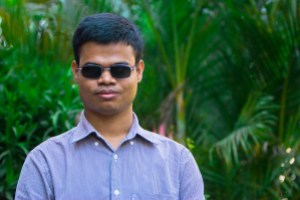Aniruddha Kumar is a very active editor on Hindi Wikipedia, making over 8,000 edits in three years. The 27 year-old Wikipedian hails from Paṭnā, Bihar, in East India and is an Assistant Professor at Delhi University, where he studies Hindi Literature. He can speak Hindi, Urdu, English and Sanskrit.

Kumar has helped with the development of Hindi Wikipedia, where he devotes much of his time to articles on Hindi literature, music and history. He works as an administrator and is the number seven editor by total contributions.
Impressive as this is, you might be surprised to learn that Kumar is blind.
To contribute to Wikipedia, Kumar uses the open-source software NVDA (Non-visual Desktop Access), developed by NV Access, a non-profit organization based in Australia and “dedicated to the ideal that access to technology should not incur an extra cost for blind and visually impaired users.” He also uses the JAWS screen reader program developed by Freedom Scientific.
Both Jaws and NVDA provide feedback through synthetic speech and Braille. For references and citations, Kumar often uses recorded Digital Accessible Information System (DAISY) books.
While he notes some limitations due to blindness, he says the unique and open collaboration on Wikipedia makes that less of an issue than with other sites.
“Wikipedia can be edited and read by anyone, unlike various things which are inaccessible for persons with disabilities,” he said. “We still have image-related problems but we don’t worry about that. We contribute as best we can. If I can’t add images to an article, then another person will.”
Kumar said he sees himself like one of millions of editors. “I’ve seen some more devoted and capable editors. I just do my job and what I like.”
He spends 2-3 hours editing Wikipedia articles on his days off, one hour during work days. If a subject particularly enthralls him, he says he will spend an entire day editing. He appreciates the absence of advertisements on Wikipedia, which saves him a great deal of time he would otherwise spend listening to extraneous jabber. On other websites, he said, he has to continually press the “down arrow on all these things that waste a lot of my time.”
For Kumar, access to free knowledge is necessary for people to live with dignity. “Having access to the combined knowledge of the world strengthens pluralism. It brings hope to growing a better and lovely world, where each works for the benefit of all.”
He said he values the collective nature of Wikipedia, where there is “something for all of us, including me. There is no barrier of nationality, ethnicity, religion, caste or gender. You don’t have to pay for a subscription, or read ads — it’s only about the right to information.”
He participated in the 2011 Wikipedia Fundraiser because he believed donating to Wikipedia was a way to protect the right to access knowledge and promote education.
Wikipedia, he said, is “one of the most beautiful things in the world.”
Story and reporting by Jordan Hu, Communications Intern
Additional reporting by Victor Grigas, Storyteller

Can you help us translate this article?
In order for this article to reach as many people as possible we would like your help. Can you translate this article to get the message out?
Start translation